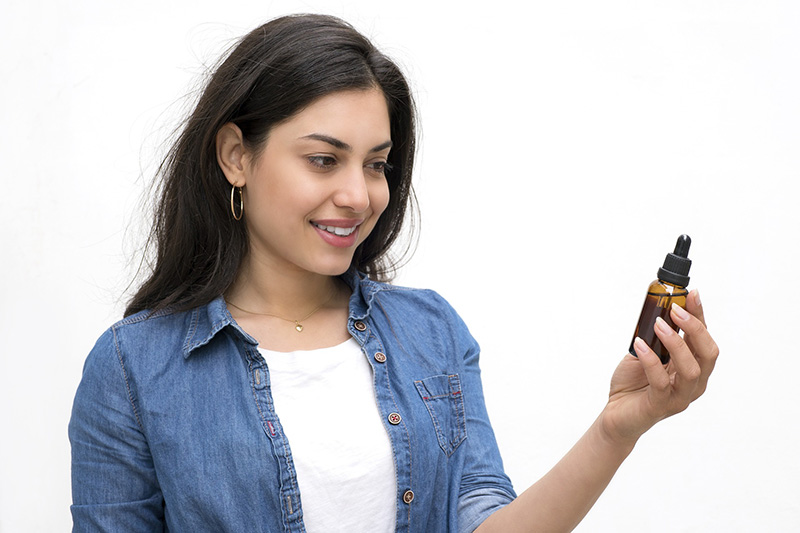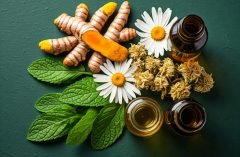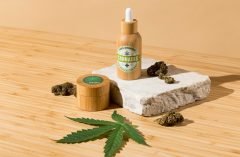Table of Contents [show]

CBD and THC – Full Spectrum CBD … the world of Cannabinoids can be confusing.
With so much buzz surrounding CBD products these days, it’s important to understand the facts and debunk any misconceptions. One of the biggest concerns people have is whether or not CBD will get them high. Well, fear not! In this blog post, we’re going to dive deep into the world of CBD and explore why you can enjoy its therapeutic benefits without experiencing that infamous “high.”
What is CBD and How Does it Work in the Body?
CBD, short for cannabidiol, is a compound found in the cannabis plant. Unlike its cousin THC (tetrahydrocannabinol), CBD does not have psychoactive properties and won’t get you high. Instead, it interacts with our body’s endocannabinoid system (ECS) to promote balance and wellness.
The ECS is a complex network of receptors throughout our bodies that helps regulate various functions like mood, sleep, appetite, and immune response. When we consume CBD, it binds to these receptors and stimulates them to produce beneficial effects.
One way CBD works in the body is by inhibiting an enzyme called FAAH (fatty acid amide hydrolase). This enzyme breaks down anandamide, often referred to as the “bliss molecule,” which plays a role in mood regulation. By inhibiting FAAH, CBD allows more anandamide to remain in our system for longer periods of time, promoting feelings of relaxation and well-being.
Additionally, CBD also interacts with serotonin receptors in the brain. Serotonin is a neurotransmitter known as the “feel-good” chemical that helps regulate mood and emotions. By modulating serotonin levels through its interaction with these receptors, CBD may help alleviate symptoms associated with anxiety and depression.
In addition to its impact on neurotransmitters and enzymes within the body’s systems,
CBD also has anti-inflammatory properties. It can reduce inflammation by interacting with immune cells responsible for this process.
Overall, CBD operates harmoniously within our bodies’ natural systems without causing intoxication or impairment commonly associated with THC consumption.
The Difference Between CBD and THC
CBD and THC are two of the most well-known cannabinoids found in cannabis plants. While they may come from the same plant, there are significant differences between these compounds.
CBD is non-intoxicating, meaning it does not produce a “high” feeling when consumed. On the other hand, THC is psychoactive and can alter your state of mind. This is why marijuana strains high in THC are sought after by recreational users.
CBD and THC interact with different receptors in our bodies. CBD mainly interacts with CB2 receptors found throughout our immune system, while THC primarily binds to CB1 receptors in our brain and nervous system.
Another difference lies in their potential health benefits. CBD has gained popularity for its therapeutic properties such as reducing inflammation, alleviating pain, and promoting relaxation. Meanwhile, THC is known for its analgesic effects as well as appetite stimulation.
Furthermore, legal regulations surrounding these cannabinoids also differ greatly. While hemp-derived CBD products containing less than 0.3% THC are federally legal in the United States under the 2018 Farm Bill, marijuana-derived products high in both CBD and THC remain illegal at the federal level but may be legal on a state-by-state basis.
In conclusion (Note: The final blog section should provide a conclusive statement), understanding the distinctions between CBD and THC can help you make informed decisions about which cannabinoid suits your needs best. Whether you’re seeking relief from specific symptoms or simply want to experience natural wellness benefits without getting high, choosing a product that contains predominantly CBD or opting for full-spectrum CBD with low levels of THC can provide you with desired results while keeping intoxication at bay!
Understanding the Misconceptions of CBD Getting You High
There has been a lot of confusion surrounding CBD and its potential to get you high. Let’s clear up some misconceptions once and for all!
CBD, or cannabidiol, is one of over 100 cannabinoids found in the cannabis plant. Unlike THC, another well-known cannabinoid, CBD does not have psychoactive properties. In simpler terms – it won’t make you feel high!
Many people mistakenly associate CBD with THC because they both come from the same source. However, their effects on the body are entirely different. While THC binds directly to cannabinoid receptors in our brain, causing euphoria and altered perception, CBD interacts differently with these receptors.
CBD works by influencing various receptors in our endocannabinoid system (ECS), which helps regulate important functions like pain sensation, mood, sleep patterns, and immune response. It promotes balance within our bodies without any intoxicating effects.
When choosing a CBD product that won’t get you high, it’s essential to look for those made from hemp-derived CBD oil rather than marijuana-based products. Hemp contains negligible amounts of THC while being rich in non-intoxicating cannabinoids like CBD.
It’s worth noting that full-spectrum CBD products may contain trace amounts of THC due to the extraction process but always remains below legal limits (0.3% or less). If you’re concerned about drug tests or want to avoid even minuscule levels of THC altogether, consider opting for broad-spectrum or isolate-based options instead.
By understanding these distinctions between different types of CBD products and debunking common misconceptions about getting high from them can help individuals confidently incorporate this natural remedy into their wellness routine without worrying about unwanted side effects.
How to Choose a CBD Product That Won’t Get You High
When it comes to choosing a CBD product that won’t get you high, there are a few key factors to consider. First and foremost, it’s important to understand the different types of CBD products available on the market. One option is full spectrum CBD, which contains all the naturally occurring cannabinoids found in the hemp plant, including THC. While the amount of THC is typically very low (less than 0.3%), it can still potentially cause psychoactive effects.
If you want to avoid any risk of getting high, your best bet is to opt for broad spectrum or isolate CBD products. Broad spectrum CBD undergoes additional processing to remove any trace amounts of THC while preserving other beneficial compounds. On the other hand, isolate CBD is purified even further so that it contains only pure cannabidiol without any other cannabinoids.
In addition to considering the type of CBD product, you should also pay attention to third-party lab testing. Reputable companies will provide certificates of analysis from independent labs that verify the potency and purity of their products.
Be sure to check for proper labeling and dosage information on the product packaging. This will help ensure that you’re using your chosen CBD product correctly and safely.
By being informed about these factors and making educated choices, you can enjoy all the potential therapeutic benefits of non-intoxicating CBD without worrying about getting high.
The Benefits of Using Non-Intoxicating CBD Products
When it comes to CBD products, there is a wide range of options available in the market. One important distinction to make is between intoxicating and non-intoxicating CBD products. Non-intoxicating CBD products are those that do not contain THC, the psychoactive compound found in cannabis that produces the “high” sensation.
One of the major benefits of using non-intoxicating CBD products is that you can enjoy all the therapeutic benefits without experiencing any mind-altering effects. This means you can go about your day as usual, whether at work or engaging in other activities, without feeling impaired or intoxicated.
Non-intoxicating CBD products also offer greater flexibility in terms of dosage and usage. Since these products do not contain THC, you don’t have to worry about getting too high or experiencing unwanted side effects. You can easily adjust your dosage based on your needs and gradually find what works best for you.
Furthermore, using non-intoxicating CBD products eliminates any concerns about legality. While THC is still classified as a controlled substance in many states, hemp-derived CBD with less than 0.3% THC content is legal under federal law.
In addition to this peace of mind regarding legality and safety, non-intoxicating CBD products also provide relief from various health conditions such as chronic pain, anxiety, inflammation, insomnia, and more.
By choosing non-intoxicating CBD options like broad-spectrum or isolate formulations over full-spectrum ones containing trace amounts of THC (less than 0.3%), you can reap all the potential benefits while avoiding any unwanted psychoactive effects associated with consuming THC.
The Legality of CBD and THC in Different States
The legal status of CBD and THC varies from state to state in the United States. While CBD derived from hemp is federally legal, individual states have their own regulations regarding its use and sale. Some states have fully legalized both medical and recreational marijuana, allowing for the use of high-THC products.
On the other hand, there are still some states that maintain strict laws against THC, considering it an illegal substance. In these states, any product containing even trace amounts of THC may be prohibited.
In several states where medical marijuana is legal, patients with qualifying conditions can access both CBD and THC products with a prescription. These states often have dispensaries where individuals can purchase cannabis-based products legally.
It’s essential to research your specific state’s laws before purchasing or using any CBD or THC products. Understanding the legality surrounding these substances will help you make informed decisions about your health and well-being.
Always remember that laws can change over time as attitudes towards cannabis evolve. Stay updated on current legislation to ensure you are compliant with local regulations when it comes to CBD and THC usage in your area.
Conclusion? Enjoy the Therapeutic Benefits of CBD Without Getting High
In this article, we have explored the truth about CBD and its potential to get you high. We discovered that while CBD is derived from the same plant as THC, it does not produce any psychoactive effects. This means that you can enjoy the therapeutic benefits of CBD without experiencing a “high” sensation.
By understanding the difference between CBD and THC, we debunked some common misconceptions surrounding CBD getting you high. It’s important to note that full-spectrum CBD products may contain trace amounts of THC, but these levels are typically too low to cause any intoxicating effects.
When choosing a CBD product, it is essential to look for third-party lab test results to ensure its purity and potency. Opting for non-intoxicating or broad-spectrum CBD products can provide peace of mind if you want to avoid any risk of getting high.
Using non-intoxicating CBD products offers numerous benefits. They can help promote relaxation, reduce anxiety and stress, alleviate pain and inflammation, improve sleep quality, enhance focus and concentration, among others. With such a wide range of potential therapeutic effects, incorporating non-intoxicating CBD into your wellness routine could be beneficial for your overall well-being.
Conclusion
It’s crucial to stay informed about the legality of both CBD and THC in different states since regulations vary across regions. While hemp-derived cannabinoids like pure cannabidiol (CBD) are legal at the federal level in many countries around the world when derived from industrial hemp containing less than 0.3% THC; some states might have stricter laws regarding their use or possession.
In conclusion, by choosing a reliable source for your non-intoxicating full spectrum or broad-spectrum CBD products with minimal traces of THC within legal limits along with considering local laws where applicable; you can safely enjoy all the therapeutic benefits that this natural compound has to offer without worrying about getting high. So, go ahead and explore the world of CBD with confidence.
CBD Articles in Spinfuel You Might Like
The Evolution of Wellness: Embracing CBD Vaping and Personalized Supplements
CBD Beyond 2023: Understanding The Expanding Marketplace
Using CBD Oils Over Aspirin for Canine Relief
Does CBD Oil Finally Have Verifiable Health Benefits in 2023 ?




